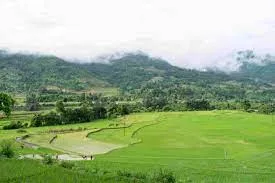Kashmir often referred to as the ‘Paradise on Earth’ is renowned for its picturesque landscapes, rich cultural heritage and agricultural diversity. Farming has been an integral part of life in this region, with practices shaped by its unique geography, climate and cultural traditions. Kashmir farmers have historically relied in age-old techniques to cultivate a veriety of crops, adapting to the region’s terrain and weather. Some key traditional practices include as under,
Terrace Farming.Given the mountainous terrain, terrace farming is widely practiced to prevent soil erosion and efficiently use water
Crop Rotation. Farmers rotate crops to maintain soil fertility and reduce pest infestations.
Organic Methods. Use of natural fertilize like cow dung and compost is common, reflecting a sustainable approach to agriculture.
Hand Harvesting. Due to small landholding and the delicate nature of some crops, harvesting is often done manually, ensuring quality produce.
Rice. The staple food of Kashmir, cultivated in the fertile plains and terraced fields.
Saffron. Kashmir is one of the few places in the world that produces high quality saffron, grown mainly in Pampore.
Apples. Kashmir apples are globally recognized for their taste and quality. Making the region India’s largest apple producer.
Wheat, Maize and Barley. These cereals are also significant crops in the region.
Walnuts and Almonds.Kashmir produces a large portion of India’s walnuts and almonds.
Modernization and Innovations. In recent years, Kashmir agriculture has witnessed a gradual shift towards modernization,
Greenhouses and Polyhouses. Farmers are adopting greenhouse farming to grow off-season vegetable and flowers.
Irrigation Systems. Improved irrigation techniques like drip and sprinkler systems are enhancing water efficiency.
Agritech Interventions. Mobile apps, weather forecasting tools and better storage facilities are helping farmers make informed decisions.
Organic Farming. Many farmers are shifting towards organic certification to cater to global demands for sustainable produce.
Challenges in Kashmir Agriculture. Despite its rich agricultural heritage, the region faces several challenges,
Climate Change. Erratic weather patterns and unseasonal snowfall often Damage crops.
Small Landholdings. Fragmentation of land limits large-scale farming
Infrastructure. Limited access to markets and cold storage facilities affects farmers profitability.
Conflict. Political instability in the region has occasionally disrupted farming activities.
The Road Ahead. For sustainable growth in Kashmir’s agriculture, a focus on,
Encouraging cooperative farming models, Providing subsidies for modern equipment,Building robust cold storage and supply chain networks, Promoting agro-tourism to combine farming with tourism.
Farming in Kashmir is a testament to the resilience and ingenuity of its people. By blending traditional practices with modern techniques. Kashmiri agriculture holds great potential to thrive in a competitive global market while preserving its rich heritage.


